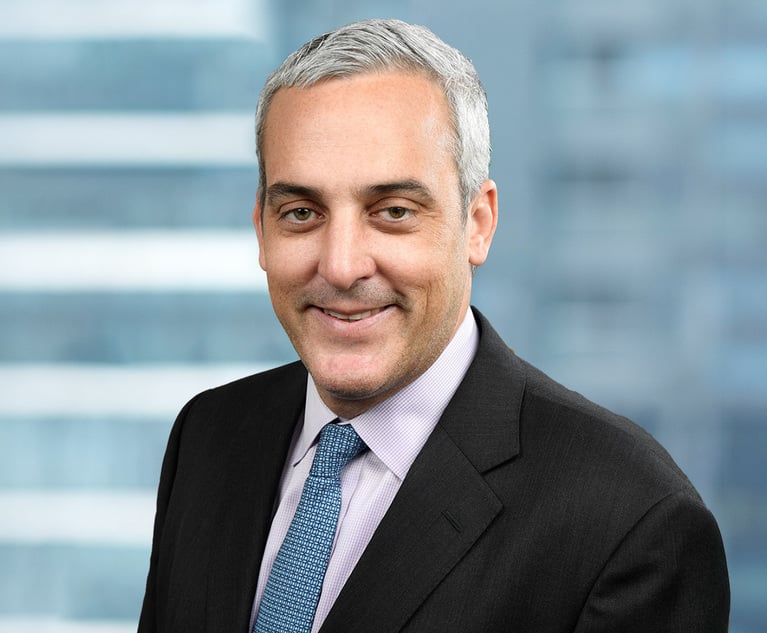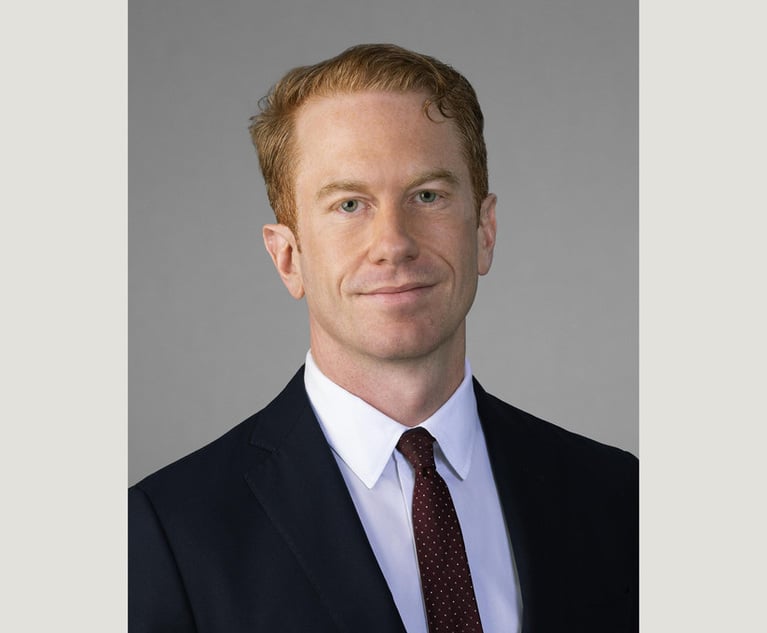From Six Months to Six Weeks: Lateral Hiring Is Speeding Up
Hiring partners are finding the benefits of virtual interviews outweigh the costs and expect to keep Zooming with potential laterals even after the pandemic recedes into memory.
July 29, 2020 at 03:50 PM
7 minute read
 Illustration of businessman with briefcase jumping over hurdles on running track.
Illustration of businessman with briefcase jumping over hurdles on running track.
In normal times, law firm partners looking to make a lateral move, particularly to a firm with a national presence, can expect to spend substantial time in the air. That's not the case right now. And cutting out that travel is serving to compress the timeline for bringing new attorneys on board.
Some recruiters and firm leaders anticipate that a growing comfort with virtual meetings will result in a permanent shift in how hiring is done, even when travel is no longer something to fear.
That means a process that once took at least six months could well become significantly shorter, sometimes as short as six weeks, said San Francisco-based recruiter Avis Caravello. And the benefits can extend after the hiring process is over.
"One thing most people don't realize is that when you come out of the recruiting process as a lateral, you're completely exhausted. You've been on airplanes for months, you're meeting tons of people," Caravello said. "Now, candidates go into the on-boarding process a lot more fresh than they did in the old days."
According to Caravello and other recruiters, most partner-level lateral moves take a minimum of six months from the start of discussions to finalizing the move. For groups or particularly high-earning partners, that figure will often hit nine months. And much of that time is simply spent by the attorneys on the move and their potential new colleagues getting familiar with each other. That generally meant visits to two or three key offices and meetings with a slew of partners at each.
"That's been replaced by Zoom," said New York-based recruiter Neil Handwerker of N Legal Search.
Mintz, Levin, Cohn, Ferris, Glovsky and Popeo managing partner Bob Bodian has been active in hiring since the start of the pandemic, most recently bringing aboard five insurance litigators from Squire Patton Boggs.
He said that while his firm has historically been able to move faster than the standard of six months, the time frame is even more compressed at present.
"The experience here is that it's much easier to get availability," Bodian explained. "You're not setting up in-person meetings, which require more of a time commitment, where to get from one office to another you need to carve out a large chunk of time."
The same goes for Armstrong Teasdale, which has relied, at least in part, on virtual recruiting to bring on roughly 30 laterals thus far in 2020. As the firm has expanded into Boston and Salt Lake City, managing partner David Braswell identified pros and cons with meeting candidates over a computer screen.
"I don't think it's as effective," he said. "There are a lot of things that you find in person that may not be apparent in the conversation: their body language, the way they carry themselves, whether they walk with an air of conviction or slumped shoulders and a downcast gaze."
The limits are also apparent in the reverse direction, when candidates meet Braswell on the computer in his basement office.
"They don't get to see our team, the tone and vibe of the place, the interaction of our team members," he continued. "I do think a lot is lost in the process."
Nonetheless, when compared to putting together travel arrangements, the comparative ease of arranging a Zoom conversation is unquestionable. That's particularly the case when Braswell, who's based in Saint Louis, is looking to ensure that colleagues from outposts like Las Vegas and Boston meet a new candidate. And even in a one-office firm, where onerous travel burdens aren't an inherent part of the lateral hiring process, the shift to virtual meetings can speed the process.
New York City midsize firm Warshaw Burstein has also been hiring during the pandemic, recently adding partners focused on intellectual property and tax work. Managing partner Fred Cummings said that while there's little difference between arranging a potential lateral's initial group interview with the firm's managing committee via the Blue Jeans platform and the mechanics of bringing her into the office to meet in person, subsequent one-on-ones with other recent arrivals or lawyers in the candidate's practice get scheduled faster.
"Our candidates are generally New York-based candidates," Cummings said. "But I think just the fact of not requiring people of coming into the office has accelerated the interview part of the process."
Hiring partners are also seeing silver linings in the new normal.
"You get to know a little bit about someone when you're getting to know someone on a Zoom call," Braswell continued, referencing the backdrop, their casual dress and even family members dropping by in the background. "The tone on a virtual interview is different. People are more relaxed. When you're on the hot seat, in a room full of several suits asking questions, that can be stressful."
Caravello echoed this point, highlighting the value of meeting new candidates and partners in their own environments.
"You're meeting the dog, the kids, the spouse, the postman, who knows," she said. "It gives them a more human feel and allows for connections to be made more quickly."
Combine this with greater speed and less stress on candidates, and Caravello believes that virtual hiring will outlast the coronavirus pandemic.
"Many firms I've worked with, they might not ever go back to the old way," she said.
Some, particularly those that have been quieter on the hiring front since March, might not have the same amount of comfort with virtual hiring.
"I'm not sold on idea that it won't go back to in person," Handwerker said. "I think it will depend just on how comfortable people got with Zoom. I think it will be firm by firm."
But it's possible that holdouts will be in the minority.
"There will be more virtual meetings than there were before. That's almost a certainty," Bodian predicted, adding that in-person meetings when individuals are in the same city will remain the norm.
Even still, Cummings—who called virtual interviews "80 to 90% as good" for getting a sense of a person—sees a role for them at single-office Warshaw Burstein, expecting many partners to work remotely with greater frequency even after a return to the workplace is possible.
"Virtual is just going to become an element of the recruiting process, just like it's an element of every other part of our practice."
For all the faults he finds in the virtual process, Braswell also sees no reason to abandon it, particularly when speed and cost considerations come to the foreground.
"Where time is imperative, you're going to resort to virtual. Where someone has more time, and you want to be able to weigh body language and other considerations, then you'll resort to the traditional way of doing things," he said. "I don't think we'll be going back to the old way of always having somebody come in."
Read More
Buoyed by Recent Gains, Firms Embrace Opportunistic Hiring Amid Pandemic
Firms Keep California Dreamin' Even as Pandemic Rages
For Laterals, Integration Means Getting Familiar With New Colleagues' 'Natural Habitats'
This content has been archived. It is available through our partners, LexisNexis® and Bloomberg Law.
To view this content, please continue to their sites.
Not a Lexis Subscriber?
Subscribe Now
Not a Bloomberg Law Subscriber?
Subscribe Now
NOT FOR REPRINT
© 2025 ALM Global, LLC, All Rights Reserved. Request academic re-use from www.copyright.com. All other uses, submit a request to [email protected]. For more information visit Asset & Logo Licensing.
You Might Like
View All

What Happens When Lateral Partners’ Guaranteed Compensation Ends?

Latham Adds Former Treasury Department Lawyer for Cross-Border Deal Guidance
2 minute read
Wachtell Partner Leaves to Chair Latham's Liability Management Practice
2 minute readLaw Firms Mentioned
Trending Stories
- 1Big Law Firms Sheppard Mullin, Morgan Lewis and Baker Botts Add Partners in Houston
- 2Lack of Jurisdiction Dooms Child Sex Abuse Claim Against Archdiocese of Philadelphia, says NJ Supreme Court
- 3DC Lawsuits Seek to Prevent Mass Firings and Public Naming of FBI Agents
- 4Growth of California Firms Exceeded Expectations, Survey of Managing Partners Says
- 5Blank Rome Adds Life Sciences Trio From Reed Smith
Who Got The Work
J. Brugh Lower of Gibbons has entered an appearance for industrial equipment supplier Devco Corporation in a pending trademark infringement lawsuit. The suit, accusing the defendant of selling knock-off Graco products, was filed Dec. 18 in New Jersey District Court by Rivkin Radler on behalf of Graco Inc. and Graco Minnesota. The case, assigned to U.S. District Judge Zahid N. Quraishi, is 3:24-cv-11294, Graco Inc. et al v. Devco Corporation.
Who Got The Work
Rebecca Maller-Stein and Kent A. Yalowitz of Arnold & Porter Kaye Scholer have entered their appearances for Hanaco Venture Capital and its executives, Lior Prosor and David Frankel, in a pending securities lawsuit. The action, filed on Dec. 24 in New York Southern District Court by Zell, Aron & Co. on behalf of Goldeneye Advisors, accuses the defendants of negligently and fraudulently managing the plaintiff's $1 million investment. The case, assigned to U.S. District Judge Vernon S. Broderick, is 1:24-cv-09918, Goldeneye Advisors, LLC v. Hanaco Venture Capital, Ltd. et al.
Who Got The Work
Attorneys from A&O Shearman has stepped in as defense counsel for Toronto-Dominion Bank and other defendants in a pending securities class action. The suit, filed Dec. 11 in New York Southern District Court by Bleichmar Fonti & Auld, accuses the defendants of concealing the bank's 'pervasive' deficiencies in regards to its compliance with the Bank Secrecy Act and the quality of its anti-money laundering controls. The case, assigned to U.S. District Judge Arun Subramanian, is 1:24-cv-09445, Gonzalez v. The Toronto-Dominion Bank et al.
Who Got The Work
Crown Castle International, a Pennsylvania company providing shared communications infrastructure, has turned to Luke D. Wolf of Gordon Rees Scully Mansukhani to fend off a pending breach-of-contract lawsuit. The court action, filed Nov. 25 in Michigan Eastern District Court by Hooper Hathaway PC on behalf of The Town Residences LLC, accuses Crown Castle of failing to transfer approximately $30,000 in utility payments from T-Mobile in breach of a roof-top lease and assignment agreement. The case, assigned to U.S. District Judge Susan K. Declercq, is 2:24-cv-13131, The Town Residences LLC v. T-Mobile US, Inc. et al.
Who Got The Work
Wilfred P. Coronato and Daniel M. Schwartz of McCarter & English have stepped in as defense counsel to Electrolux Home Products Inc. in a pending product liability lawsuit. The court action, filed Nov. 26 in New York Eastern District Court by Poulos Lopiccolo PC and Nagel Rice LLP on behalf of David Stern, alleges that the defendant's refrigerators’ drawers and shelving repeatedly break and fall apart within months after purchase. The case, assigned to U.S. District Judge Joan M. Azrack, is 2:24-cv-08204, Stern v. Electrolux Home Products, Inc.
Featured Firms
Law Offices of Gary Martin Hays & Associates, P.C.
(470) 294-1674
Law Offices of Mark E. Salomone
(857) 444-6468
Smith & Hassler
(713) 739-1250










